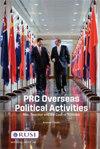IV. The Fragile Decoupling of Regional Power Plays
Q4 Social Sciences
引用次数: 1
Abstract
While the current intensification of Gulf–Asian relations shows an evolution over the last decade from mere trade exchanges to nascent security cooperation, the eventual outcome of this rapprochement remains uncertain. As the details of these ties mentioned in previous chapters indicate, the hedging approach of Gulf and Asian powers comes from a cautious position. Decision-makers on both sides have ensured that they do not challenge pre-existing security arrangements, nor do they explicitly target one country. They have refrained from interfering in the issues of the Gulf or the Asian security complexes, in order not to choose one side over the other. In other words, Gulf and Asian powers have tried to build a strategic framework to their relations without being trapped in the classic zero-sum game of alliances. But hedging without balancing or antagonising is a delicate game that can create confusion, requiring an ability to decouple cooperation with one state from the local power plays in which this state may be involved. This might work on an occasional basis and with a limited scope, but in the long term, strategic relations will inevitably reshape regional security complexes and induce realignments that neither Gulf states nor Asian states seem willing to trigger themselves. This is why there remain some unknowns at the core of new Gulf–Asia geopolitics. This chapter explores three specific conundrums Gulf and Asian countries may face in the near future, each of which would confront them with critical choices. The first case is India’s ‘Look West’ policy with the Arabian Peninsula, and how it will eventually put into question Gulf historical relations with Pakistan. The second case is Iran–Asia relations. Despite the intensification of their relations with Saudi Arabia and the UAE, countries such as China and India continue to cooperate with Iran in several fields, including energy security and the naval domain. Given the current level of enmity between Tehran and the GCC, any development on Asian–Gulf strategic cooperation will call for a clarification. The third unknown relates to the四、地区权力博弈的脆弱脱钩
虽然目前海湾-亚洲关系的加强显示出在过去十年中从单纯的贸易交流到新生的安全合作的演变,但这种和解的最终结果仍然不确定。正如前几章提到的这些关系的细节所表明的那样,海湾和亚洲大国的对冲策略来自谨慎的立场。双方的决策者都确保他们不会挑战已有的安全安排,也不会明确针对某个国家。他们避免干涉海湾或亚洲安全联合体的问题,以免选择一方而放弃另一方。换句话说,海湾和亚洲国家试图为它们的关系建立一个战略框架,而不是陷入经典的零和联盟游戏。但是,在不平衡或对抗的情况下模棱两可是一种微妙的游戏,可能会造成混乱,需要有能力将与一国的合作与该国可能参与的地方权力活动分离开来。这可能在偶尔的基础上和有限的范围内起作用,但从长远来看,战略关系将不可避免地重塑地区安全复合体,并引发海湾国家和亚洲国家似乎都不愿意自己引发的重新调整。这就是为什么新的海湾-亚洲地缘政治的核心仍然存在一些未知数。本章探讨了海湾和亚洲国家在不久的将来可能面临的三个具体难题,每一个都将使它们面临关键的选择。第一个例子是印度对阿拉伯半岛的“向西看”政策,以及它最终将如何使海湾地区与巴基斯坦的历史关系受到质疑。第二个例子是伊朗与亚洲的关系。尽管与沙特阿拉伯和阿联酋的关系有所加强,但中国和印度等国仍在几个领域与伊朗合作,包括能源安全和海军领域。鉴于德黑兰与海湾合作委员会之间目前的敌对程度,亚洲-海湾战略合作的任何发展都需要澄清。第三个未知与……有关
本文章由计算机程序翻译,如有差异,请以英文原文为准。
求助全文
约1分钟内获得全文
求助全文
来源期刊

Whitehall Papers
Social Sciences-Archeology
自引率
0.00%
发文量
12
期刊介绍:
The Whitehall Paper series provides in-depth studies of specific developments, issues or themes in the field of national and international defence and security. Published three times a year, Whitehall Papers reflect the highest standards of original research and analysis, and are invaluable background material for policy-makers and specialists alike.
 求助内容:
求助内容: 应助结果提醒方式:
应助结果提醒方式:


